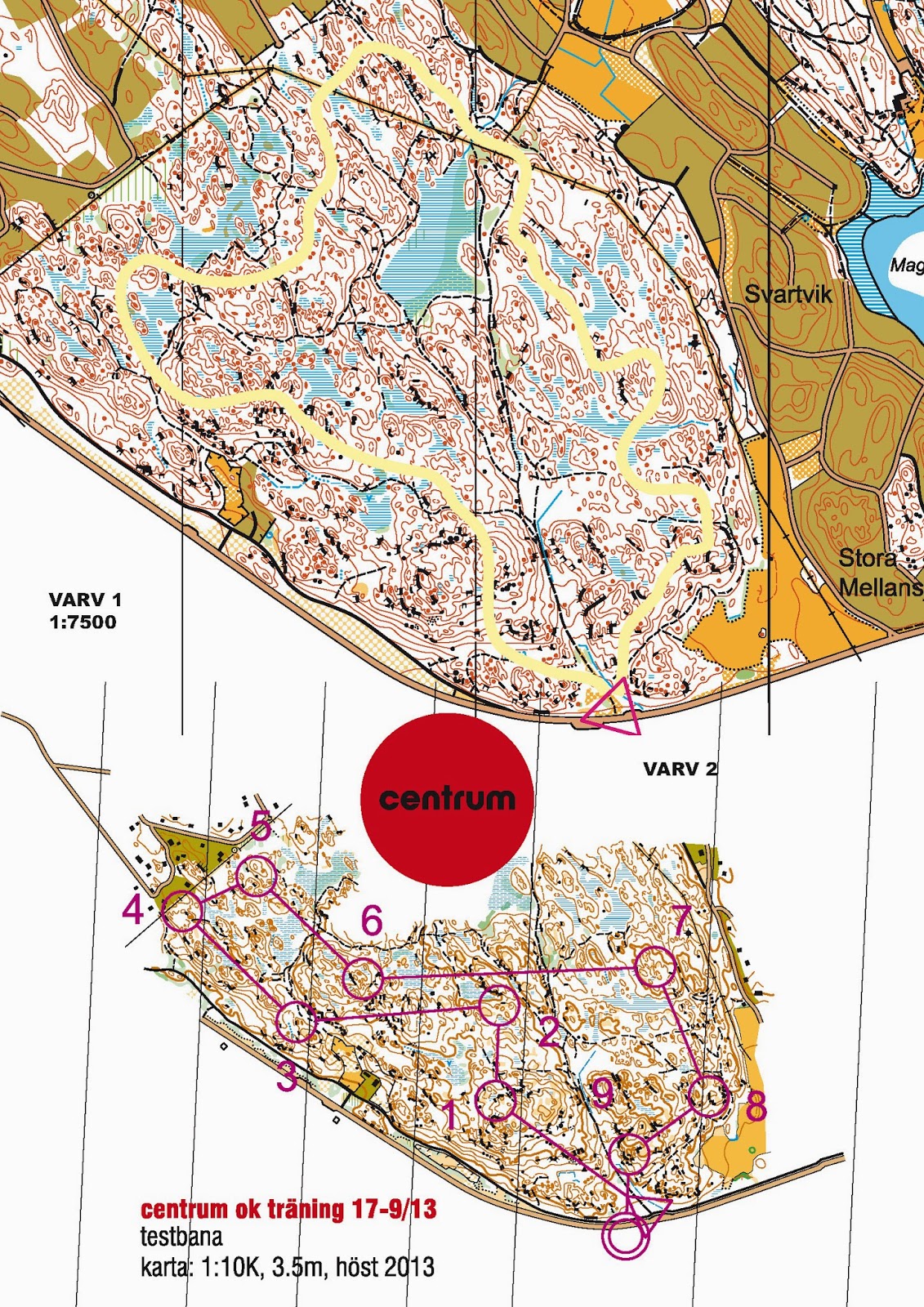Generalisation / contour lines
r.du..d m.p
Conclusion: Pretty demanding.
Routechoices
The route test (I against I against I)
Concept: The participant runs the same loop three times on different routes to really evaluate his/her route choices.Conclusion: Interesting
Just a looong leg
Concept: What the name says: Just a looong leg.Conclusion: Fun I GPS and 2DRerun are involved.
Being Jerk R. m.m.
Concept: A night-training for beginners. A veteran leads a group of beginners through the course and loudly shares his concepts and reflections.Conclusion: Pretty effective and good for the integration of the new ones into the club.
Compass
The tree moves (compass-training)
Concept: Here we trained proper compass handling by focusing on the bodies moves. (1. To hold a direction turn your body until compass, map and the bodies vector get in accordance. 2. While the bodies temporary leaves the accordance, keep map and compass in it by outbalancing with your arm 3. If you change direction you are aiming to, turn your map and then bring everything into accordance)Conclusion: Positive response
Compass Maze
Concept: This is supposed to be a compass training in three parts: A long leg, a maze and a series of short, turning controls. Especially the maze is demanding as it forces the participant to work with most objects only on-sight.Conclusion: Very demanding.
Stay on the line
Concept: Another
night compass training. This time the task is to stay on the use the
compass to stay on the purple line wherever it is applied.Conclusion: Demanding and useful.
Pac Man Maze
Concept: Another maze with the special feature, that "monsters" may not be are moving inside the maze which may not be intersect.Conclusion: Demanding fun!
The straight corridor
Concept: Straight corridors to train a combination of compass and detailed navigationConclusion: Useful, especially in terrain which otherwise is known or as dominant track network.
Broad view
Anti-corridor
Concept: Participants try to stay on the line, masking the map. That way they are forced to navigate the map aside the line to succeed.Conclusion: Tough and useful.
On sight orienteering
Concept: A control is punched as soon as it is spotted (I got this from okansas). Most of the controls are marked with a colored ribbon. Some have actually flag. There the team switches role from spotter to controller and vice versa.Conclusion: Demanding for the participants and the organizer
The eagle eye
Concept: Training in pairs (spotter & controller). On the way to the control the pair must mandatory spot the objects marked by green circles. Pointing out shall happen as early as the object gets in sight. To put the pressure on the spotter, the controller will point out that s/he saw the object about ten seconds after it happened. Change of the rolls as soon the spotter spotted the regular control or the respective object. Discussion after the training on the different usability of objects as beacon.Conclusion: maybe a bit too much? Nice layout by Daniel though.
The Sailor
Concept: Another anti-corridor combined with the some "missing control objects". Both aim to train a broad view.Conclusion: Demanding and useful (plus nice layout by Daniel)
Mapreading
Golf orienteering
Conclusion: Fine and Fun.
Relay
Malus-Massstart
Concept: the performance in our club is spread. So you need to think of training setting fun for everybody. In this case me and Daniel tried to keep the group together by letting the pack leaders run some extra controls. We therefore grouped the controls. At every control we fixed pile with a elaborated number of post-its (the earlier in a "group" the more). Participants punched by picking one sheet (as long as there where sheets left). As long as one managed to get a sheet s/he was allowed to continue. Instead as soon as all sheets were picked one should proceed directly to the beginning of the next group of controls.Conclusion: Fun!
Jukola-training (in pairs)
Concept: On our level independent route choice at big relays is almost ever the wrong choice. It is more often faster to stay in the pack and to control what the pack actually is doing. In this exercise we build teams of two runners equipped with to different maps (see above). The first leads on the long leg towards his/her control, being there, the second takes over the lead to his/her own forking and than on the following longer leg, while the other, following keeps track on where the pair is actually running to. etc.Conclusion: Useful.
Jukolatraining with focus on start
Concept: One particular thing with the big relays is, that you never know exactly when to start until 45 seconds before you will have to. In this exercise we combined a pretty common midsummer night-training with the element of the big relay (not mass-) start element. We let them start hasty, we let them start late, we let them start alone, in groups and in a chasing position. All directed by a prepared timed script which is read at the start. Another element I used here where unanounced forkings.Conclusion: Fun and useful to simulate.
Tactics and fun
Team Orienteering
Concept: A team has to complete a course (punch the controls in the right order) but must not stay together all the way. This is a common competitive discipline in Switzerland. The course should open the many possibilities to short-cut opening up for the tactial and coordinative game.Conclusion: Fun!
Dart-orienteering
Concept: A one hour score orienteering with the specialty, that the participants are only allowed to pick a certain number of controls before returning to the starting point. The number for each turn is defined by how good they perform with darts. Thus something like biathlon.Conclusion: Fun.

















.jpg)





Keine Kommentare:
Kommentar veröffentlichen